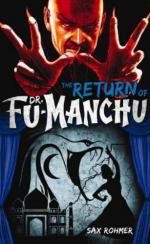Indeed, despite his Eastern blood, he might have posed for a Sadler picture, his small and refined features seeming out of place above the bulky body.
“Can you forgive my clumsiness,” I began—
But the bishop raised his small, slim fingered hand of old ivory hue, deprecatingly.
His system was supercharged with typhoid bacilli, and, as sometimes occurs, the superfluous “bugs” had sought exit. He could only walk with the aid of two stout sticks, and bent very much at that. His left leg had been surgically scraped to the bone, and I appreciated the exquisite torture to which my awkwardness had subjected him. But he would entertain no apologies, pressing his inquiry respecting Karamaneh in the kindly manner which had made him so deservedly popular on board.
“Many thanks for your solicitude,” I said; “I have promised her sound repose to-night, and since my professional reputation is at stake, I shall see that she secures it.”
In short, we were in pleasant company, and the day passed happily enough and without notable event. Smith spent some considerable time with the chief officer, wandering about unfrequented parts of the ship. I learned later that he had explored the lascars’ quarters, the forecastle, the engine-room, and had even descended to the stokehold; but this was done so unostentatiously that it occasioned no comment.
With the approach of evening, in place of that physical contentment which usually heralds the dinner-hour, at sea, I experienced a fit of the seemingly causeless apprehension which too often in the past had harbingered the coming of grim events; which I had learnt to associate with the nearing presence of one of Fu-Manchu’s death-agents. In view of the facts, as I afterwards knew them to be, I cannot account for this.
Yet, in an unexpected manner, my forebodings were realized. That night I was destined to meet a sorrow surpassing any which my troubled life had known. Even now I experience great difficulty in relating the matters which befell, in speaking of the sense of irrevocable loss which came to me. Briefly, then, at about ten minutes before the dining hour, whilst all the passengers, myself included, were below, dressing, a faint cry arose from somewhere aft on the upper deck—a cry which was swiftly taken up by other voices, so that presently a deck steward echoed it immediately outside my own stateroom:
“Man overboard! Man overboard!”
All my premonitions rallying in that one sickening moment, I sprang out on the deck, half dressed as I was, and leaping past the boat which swung nearly opposite my door, craned over the rail, looking astern.
For a long time I could detect nothing unusual. The engine-room telegraph was ringing—and the motion of the screws momentarily ceased; then, in response to further ringing, recommenced, but so as to jar the whole structure of the vessel; whereby I knew that the engines were reversed. Peering intently into the wake of the ship, I was but dimly aware of the ever growing turmoil around me, of the swift mustering of a boat’s crew, of the shouted orders of the third-officer. Suddenly I saw it—the sight which was to haunt me for succeeding days and nights.




